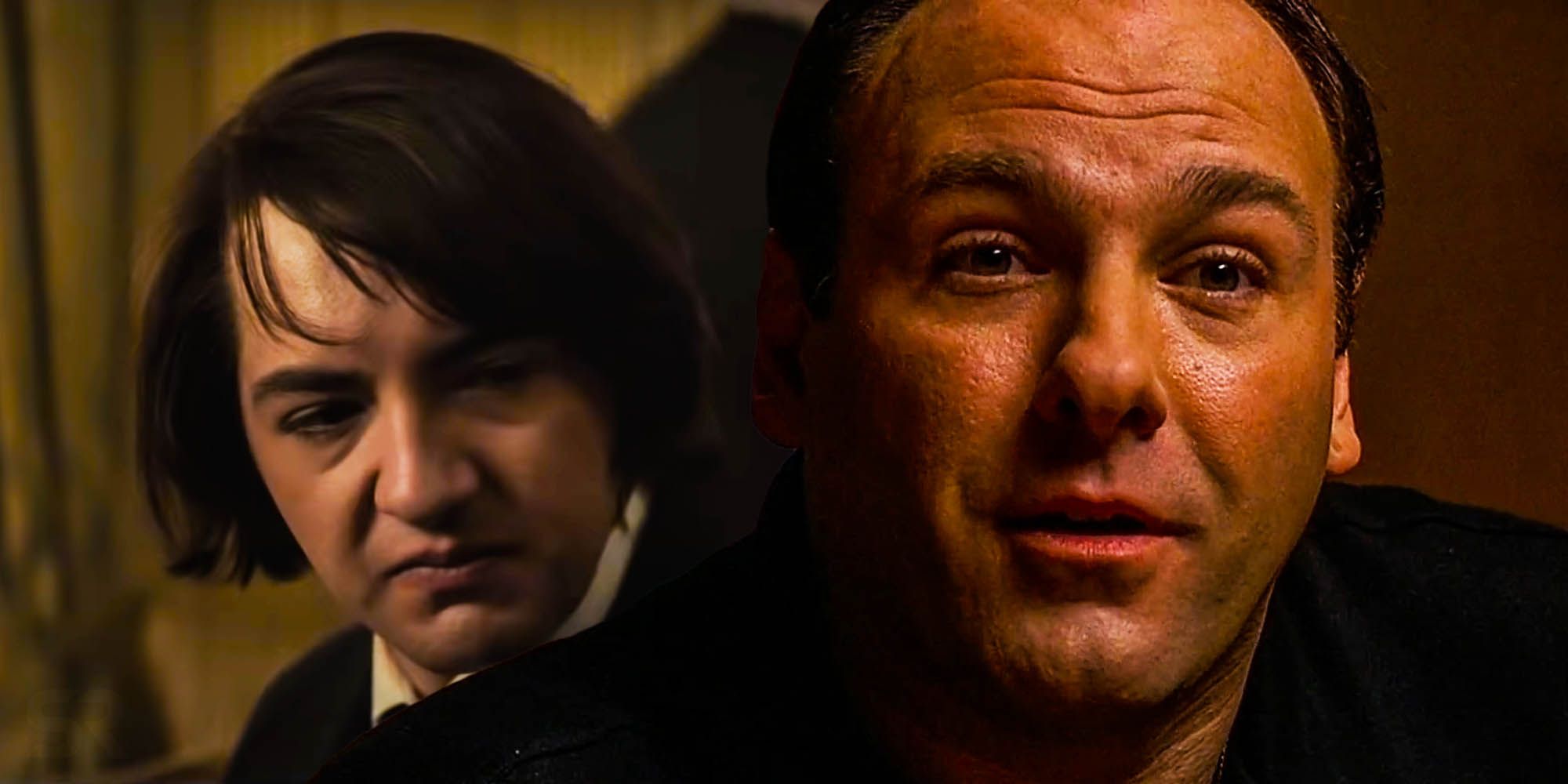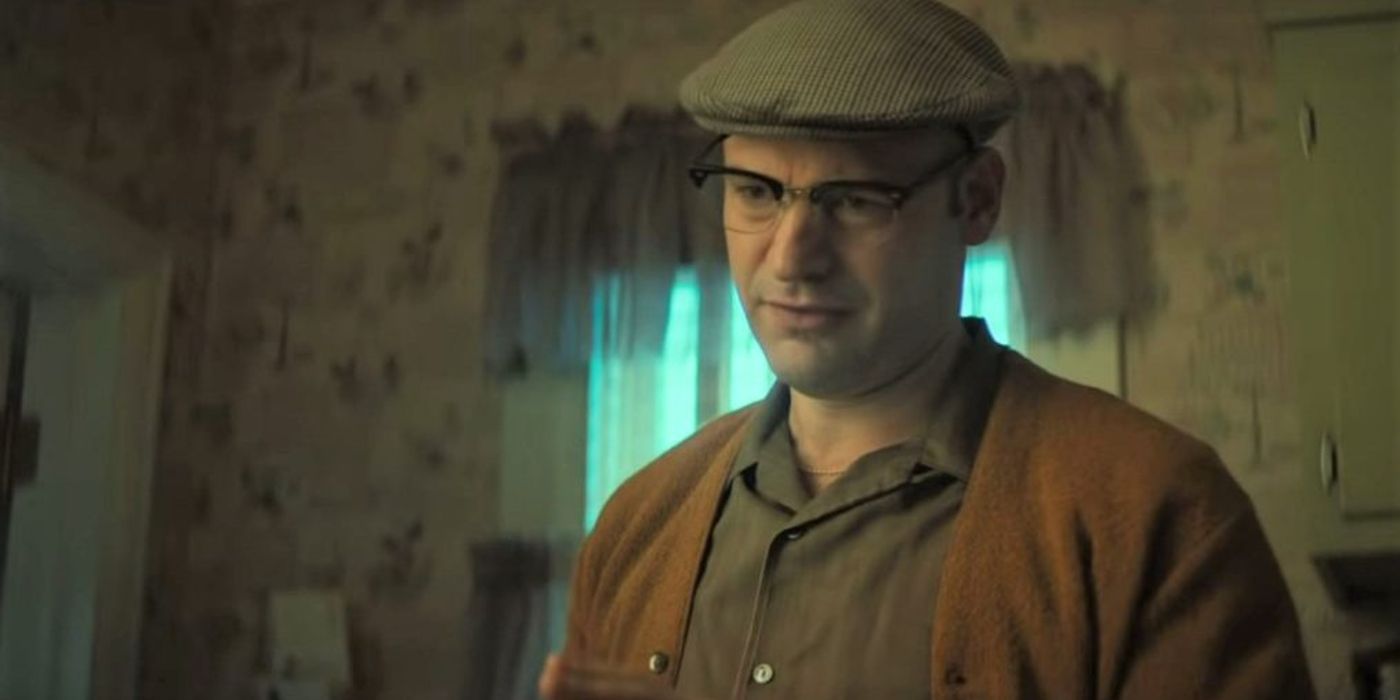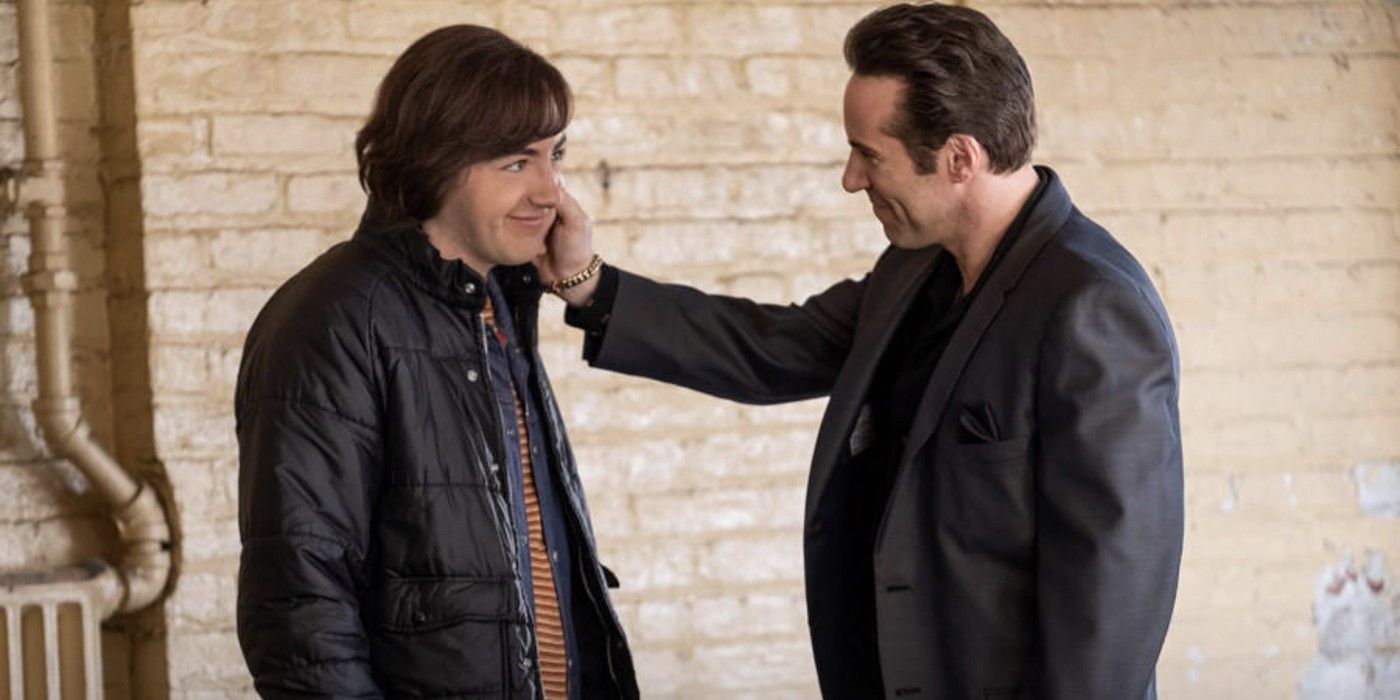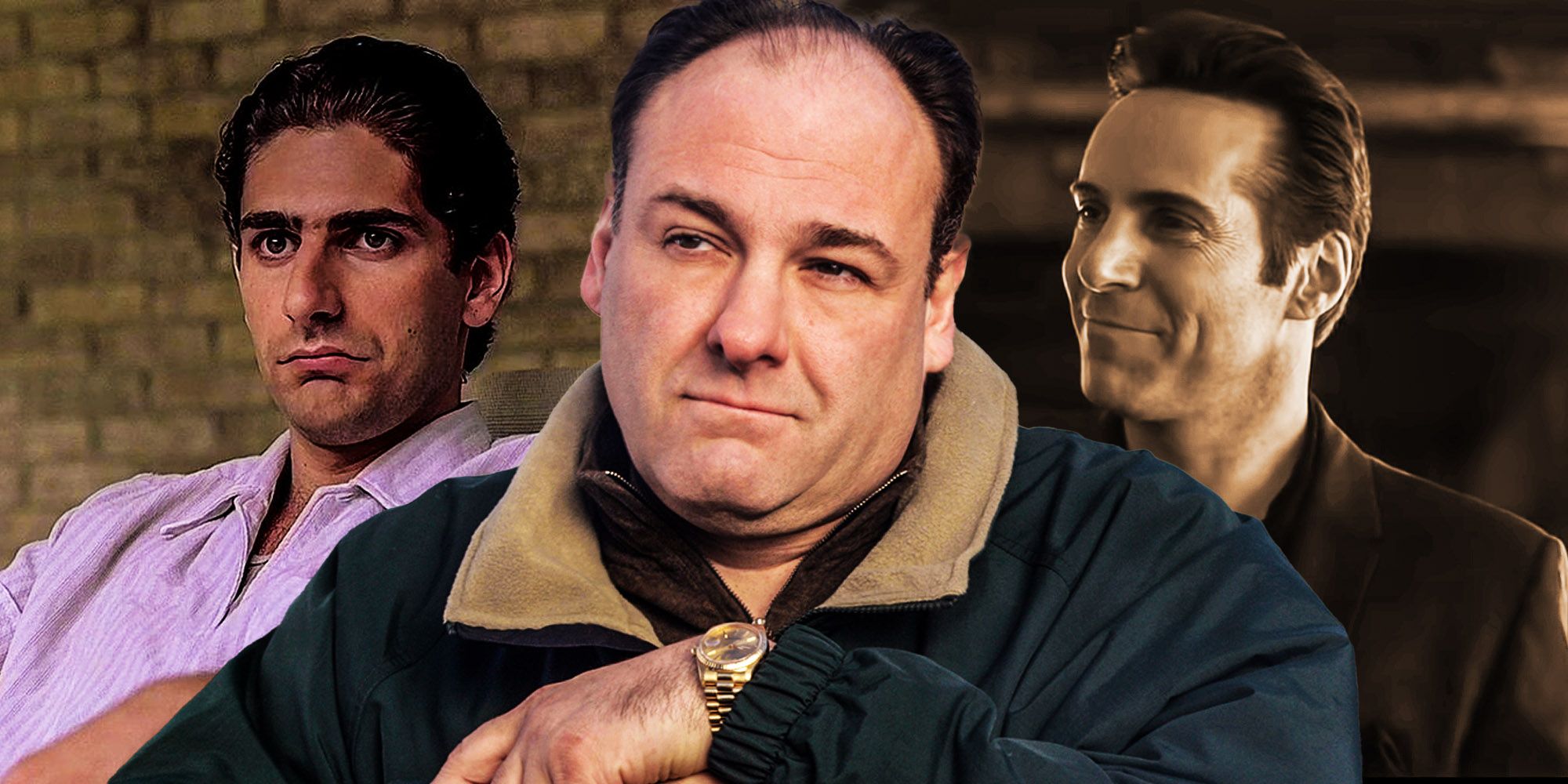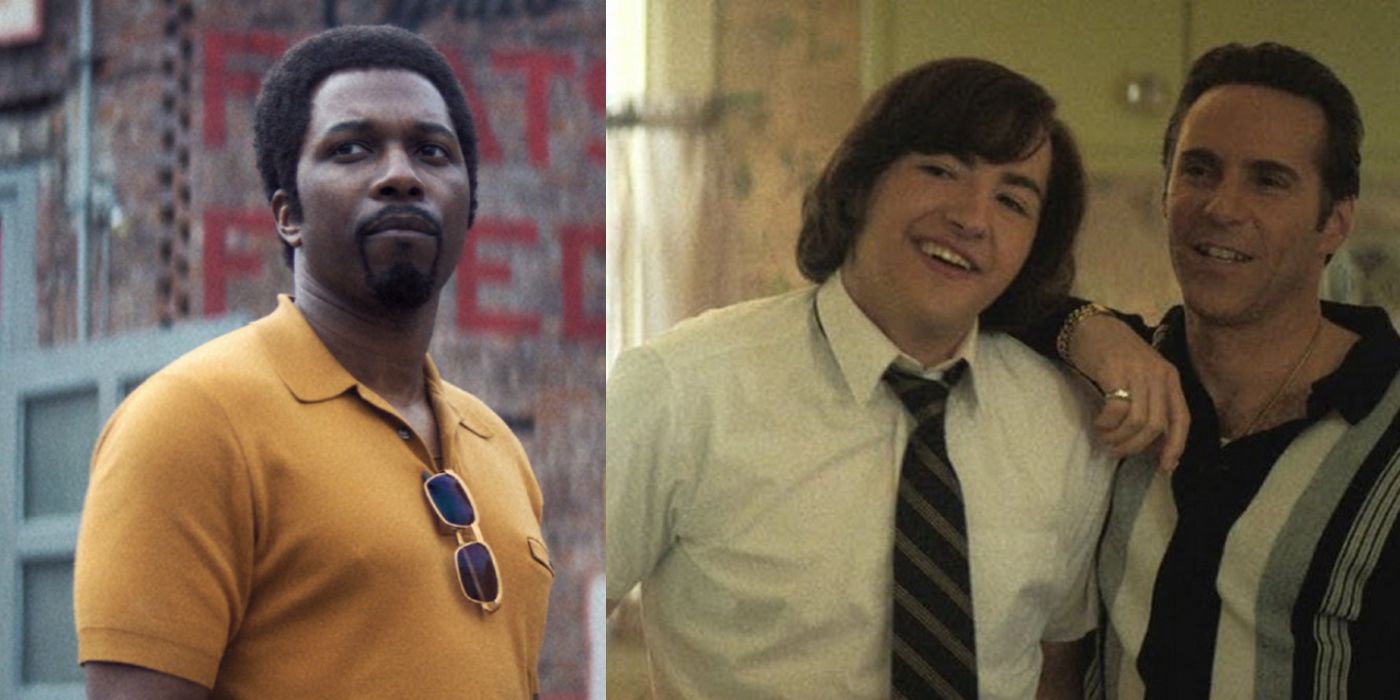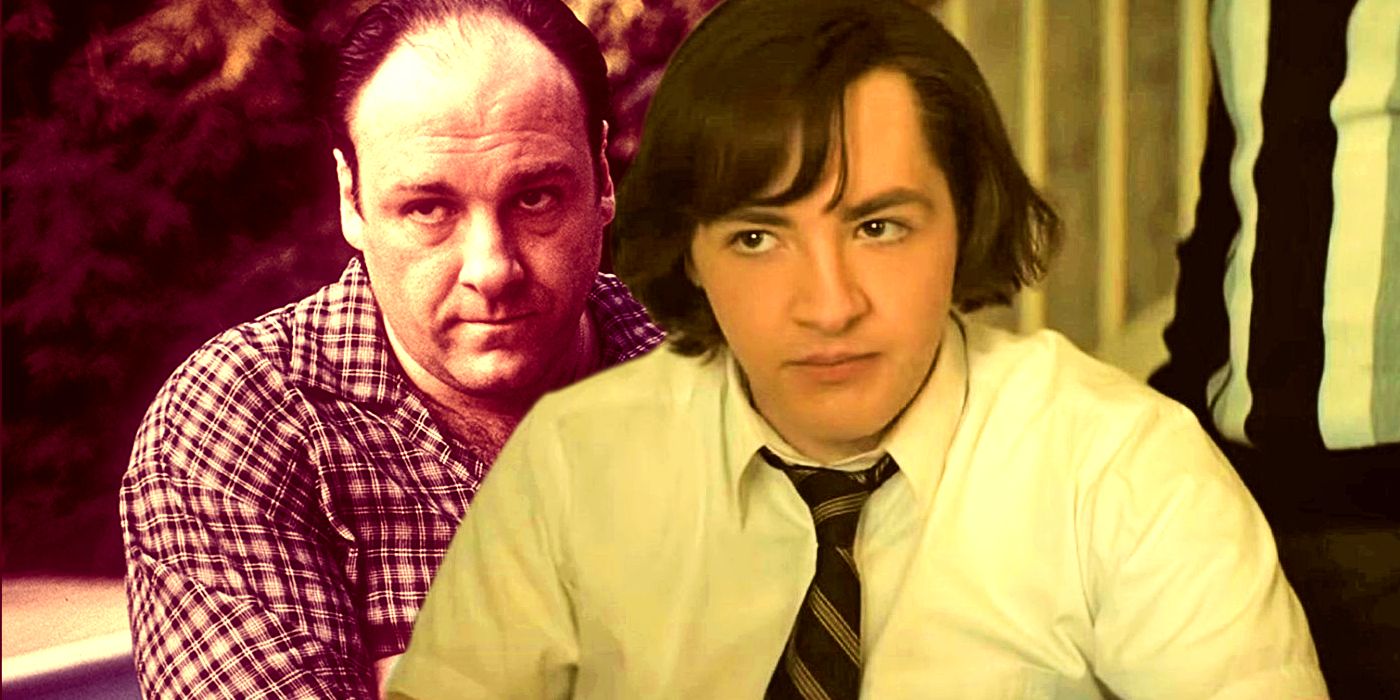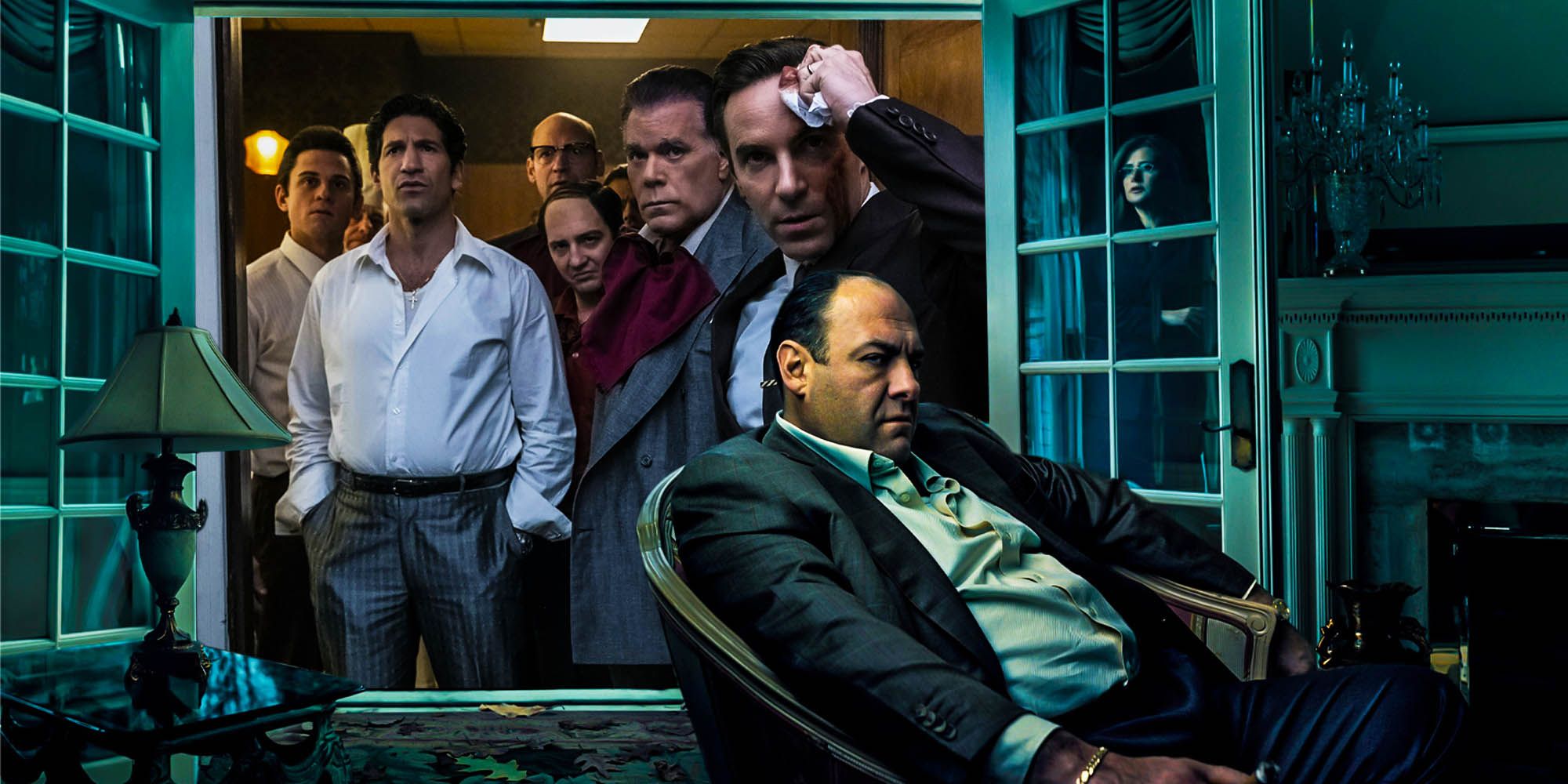Warning: Contains SPOILERS for The Many Saints of Newark.
David Chase's The Many Saints of Newark's ending wraps-up its main story, but leaves the door opening for a sequel to further bridge to The Sopranos. Over a decade after The Sopranos' cut-to-black finale brought Tony's journey to an ambiguous ending, Chase has returned to the New Jersey crime world for a prequel centered around Dickie Moltisanti (Alessandro Nivola), the father of Christopher and "uncle" to Tony. Of course, there's much more to the narrative than that, especially with the presence of Tony himself (played by Michael Gandolfini as a teenager, and William Ludwig as a child) looming large over the movie.
Parts of this movie were already written before The Sopranos had even ended; there are moments mentioned in the show that appear here, such as Johnny Boy Soprano (Jon Bernthal) shooting through Livia's (Vera Farmiga) hair. Others are recreated entirely, like the scene of Johnny being arrested after Tony follows him and Janice (Mattea Conforti as a child; Alexandra Intrator as teenage Janice). It's a sprawling narrative that perhaps would have been better suited to TV; indeed, the great irony of Chase's career is that he wants to make movies (which is how The Sopranos initially started out), but is incredibly good at television.
It all builds to a climax that is, perhaps, similarly pre-determined: the death of Dickie Moltisanti, and the setup for Tony to eventually become the leader of the Sopranos Crew. These events are rooted in the HBO show itself, but how Chase gets there - and who is responsible for them - are a little more surprising.
Why Junior Soprano Kills Dickie Moltisanti
In The Sopranos, viewers are told that a cop was responsible for killing Dickie Moltisanti, with Christopher then returning the favor. At the time, the moment was questionable at best: the man in question, Barry Haydu, denied all knowledge of being involved or even knowing Dickie; at the same time, he's someone who Tony wanted killed off because, since he was retiring from the police force, he was no longer of use to the DiMeo crime family. That left the lingering question over who killed Dickie, and The Many Saints of Newark gives a surprising answer with an even more surprising reason in the form of Corrado "Junior" Soprano (Corey Stoll).
The Many Saints of Newark's ending reveals that Junior ordered the hit on Dickie - though whether or not it is indeed the cop who carries it out is unclear. Junior's reasons are petty, although befitting the character. On the surface, he does it simply because Dickie laughed at him when he slipped and injured his back. That is part of it, but only as a piece of the larger whole that is Junior Soprano's entire life and his place in the crime family. Junior has always felt slighted and cheated; like he deserved to be dealt a better hand, but has been screwed over by the universe and everyone around him. Similarly, he sees himself as always having been put down by Dickie and those like him. Junior wants to get ahead, believing himself worthy of a better seat at the table, and he's proved time and again he'll do anything necessary to get there. Likewise, he isn't above the ultimate revenge for perceived slights. This is a man who tried to have Tony, his own nephew and the boss of the family, killed because of comments about oral sex. Junior is a small, fragile man and has to find a way to take that out somehow, even if it's killing one of his own.
Tony's Pinky Swear & The Sopranos Theme Song Over The End Credits Explained
Somewhat unsurprisingly, The Many Saints of Newark's ending comes down to Tony Soprano and Dickie Moltisanti, albeit with a twist. The closing moments of the movie proper are Tony standing above his coffin, performing an imaginary pinky promise with his now-dead uncle. Previously, their pinky swear had been a deal for Tony to be good, but now it takes on even greater significance. In a sense, it is still Tony being good, but through the lens of what he believes Dickie wants for him: to take his rightful place in the Sopranos Crew, to make the step up, to become the man. Tony's pinky promise to Dickie is an implicit pact that he will become just like him and more; that he will serve as a father figure to Christopher, and that he'll carry the family forward.
This is supported by the few strands of The Sopranos theme song - "Woke Up This Morning" by Alabama 3 - that begin to kick in as Tony looks down upon his uncle. This is where The Many Saints of Newark's story ends, and The Sopranos' begins. Moltisanti translates to "Many Saints," and so his death the fitting capstone on the movie, it is somewhat literally the end of the Many Saints, and the torch passes on to Tony. The theme song hammers this point home, reinforcing that Tony is the "Chosen One" and now it's his time to shine.
Dickie's Story Is A Dark Mirror To Tony & Christopher In The Sopranos
For the relationship between Dickie and Tony in The Many Saints of Newark, see the one between Tony and Christopher in The Sopranos. In the former, Dickie serves as a father figure and Uncle (even though he's not related) to Tony, the only one he'll listen to and who can guide him to reaching his full potential. Tony is the apprentice there, but he becomes the master in The Sopranos, with Christopher fully under Tony's wing as he looks out for him, sets him up with great opportunities, and teaches him the ropes necessary to one day take his place in the crime family and become its new leader. The difference, though, is that Tony gets to see it through, which means a much darker ending for their relationship than the one between Dickie and Tony.
In The Many Saints of Newark, Dickie is warned away from Tony by his own uncle, Sally (one of two roles played by Ray Liotta). There's a reasonable question of whether these prison-set sequences are real, or if they're dream or vision sequences experienced by Dickie as a means of coping with murdering his father and finding a sense of atonement, since Sal is very much the opposite of Hollywood Dick Moltisanti but provides the wisdom and guidance he has been missing. Regardless, Dickie ultimately takes that advice and pushes Tony away. It isn't enough, as Tony ends up following in his footsteps anyway, but Sal's words are proven true in The Sopranos when Tony kills Christopher. Is that the fate that awaited Dickie and Tony had their relationship continued? It's hard to say, but based on both The Many Saints of Newark and The Sopranos, it seems reasonable to assume yes.
Does Harold Get Killed In The Many Saints Of Newark's Ending?
Most of The Many Saints of Newark's characters are rooted in The Sopranos, but one key player who is completely new to the saga is Harold McBrayer (Leslie Odom Jr.). An old friend-turned-rival of Dickie's, Harold is initially setup as Dickie's would-be murderer, only for the rug pull that Junior beat him to the punch. Following on from the main ending to The Many Saints of Newark, but before the credits roll, things pick back up with Harold on the street, a white man eyeing him suspiciously, which is a moment with a couple of possible meanings. The first ties into The Many Saints of Newark's approach to race, something that, for all the 1967 Newark Race Riots are a backdrop to the movie, it doesn't get too deep into. But what the movie does show is the fear and hatred a lot of people had (and have) for people of color. It's seen when Johnny Boy gets out of prison and discovers a Black family is living in the neighborhood, and it's there when Harold is unpacking on the street, the suggestion that he will always be eyed with suspicion, and that being in this crime game is going to be all the more difficult for him than it is the Sopranos of the world, who breeze through unaffected by the Newark riots.
The end scene with Harold is also something of a reminder of the life he has chosen, and the fate that may await him. Much like The Sopranos' ending is not about whether Tony lives or dies, but that he will forever be looking over his shoulder, glancing up at bells and checking who is coming through the door, the end scene of Harold in The Many Saints of Newark says something similar. Harold could end up being blamed for Dickie's death, given their escalating rivalry, and if that's the case then he's going to have to keep a close eye on people and be wary of anyone staring at him like in the final scene here. He will forever have to be cautious and careful and, because he's a Black man, that takes on a double-meaning in the movie.
Many Saints Of Newark Is Haunted By The Ghosts Of Sopranos' Future
David Chase's drama was many things, but one key aspect of The Sopranos was its supernatural storyline. While often hidden out of plain sight, The Sopranos was, for a show about gangsters, surprisingly given to paranormal tendencies. Tony was frequently haunted by memories of those he'd killed, brief flickers of characters could be seen even after they'd departed, and there were suggestions of ghosts being real in the show's universe. The Many Saints of Newark continues this theme. One key scene sets up Tony killing Christopher, with the baby version of the latter crying whenever he's around him. It's remarked that babies, when they come into this world, have knowledge from the other side, and this would fit with The Sopranos' storytelling.
Beyond that specific moment, The Many Saints of Newark is very much haunted by the ghosts of Sopranos yet to come. This is true in the narration of Christopher in the Sopranos prequel, commentating on events from beyond the grave, but it goes further with the movie's story and everything it is defined by. The Many Saints of Newark is all in service of The Sopranos to the point it is haunted by it; the specters of who Tony, Livia et al become hang over them even as them themselves still live, as if calling to them, beckoning them in the directions they must travel. The familial traumas, the crimes, misdeeds, and murders are intwined in past, present, and future, mirroring one another as they echo down through the ages and come bouncing back, each shaping the other.
Many Saints Of Newark 2? How It Sets Up A Sequel & The Sopranos
David Chase has expressed interest in a sequel to The Many Saints of Newark and, based on the ending, it's easy to see where such a story would go. Tony ends the movie very much ready to step into the crime family; it'll be another decade plus before Johnny Boy dies, but there's a lot of scope to get into developing the Tony that viewers of The Sopranos will recognize. The one in the movie is still several steps away from that - more naive, more innocent, more purely good - but he is ready to change. Tony's first murder, for instance, seems like a natural story point for The Many Saints of Newark to include, while it could also bring closure to Harold's journey. There's room for greater development in many of The Sopranos characters in the film too, several of whom - like Paulie Walnuts (Billy Magnussen) and Salvatore "Big Pussy" Bonpensiero (Samson Moeakiola) - exist only on the periphery.
Going beyond The Many Saints of Newark ending and sequel, there are clear lines to be drawn from the prequel to the show it is serving. Yes, Tony will become the leader and the first flicker of those origins can be found here. Key partnerships, like Silvio Dante's (John Magaro) loyalty to Tony are established. Perhaps more tellingly, and movingly, is Tony's relationship with his mother, Livia. To call it complicated would be an understatement, and The Many Saints of Newark adds new layers to it. Whereas The Sopranos paints Livia as an almost demonic presence in Tony's life, a figure of hate and bile, here she is one of tragedy, someone who has been worn down and wiped out by her husband's behavior and her own struggles. Tony's attempts to connect with, save, and love his mother are poignant and give new meaning to their story in The Sopranos, whereby he both wants to help and hurt her. There is no cut-to-black ending for The Many Saints of Newark, but in its final moments viewers know exactly where the journey is headed, and that Tony's story - whether a sequel happens or not - will indeed go on, and on, and on.

